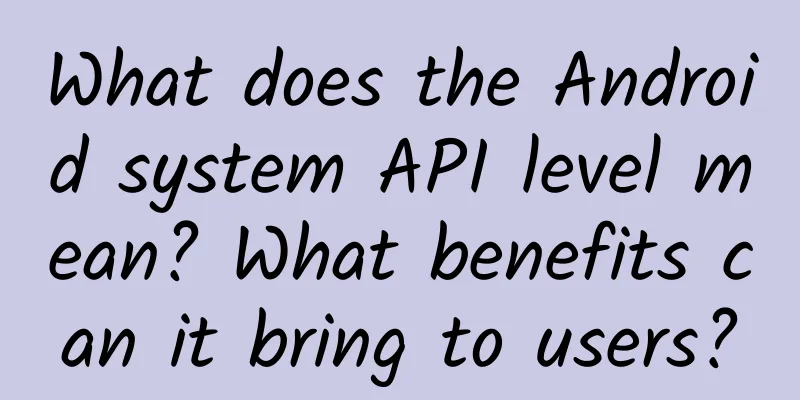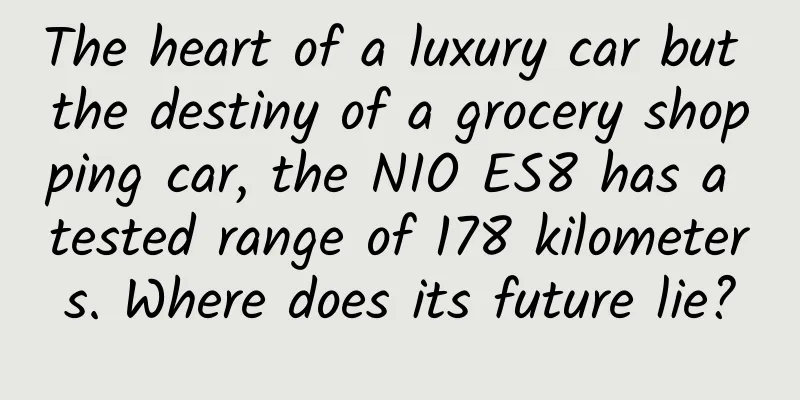What does the Android system API level mean? What benefits can it bring to users?

|
According to the official WeChat account of Telecommunication Terminal Laboratory, on the morning of July 18, 2018, the Telecommunications Terminal Industry Association (TAF) issued the "Self-Discipline Convention on High API Level Pre-installation and Distribution of Mobile Application Software" (hereinafter referred to as the "Convention"). OPPO, Huawei, Baidu, 360, Alibaba, Xiaomi, vivo, and Tencent, as initiators, jointly signed the "Convention" and issued a joint initiative: calling on the majority of mobile application software pre-installation and distribution service providers to refuse to list and promptly update applications with low API levels, and jointly safeguard the rights and interests of users. The signing ceremony of the Convention The Convention stipulates that starting from May 1, 2019, new and pre-installed applications should be developed based on Android 8.0 (API level 26) and above. Starting from August 1, 2019, updates to existing applications should be developed based on Android 8.0 (API level 26) and above. At the signing ceremony, the eight manufacturers solemnly promised that they would strictly abide by and implement the provisions of the self-discipline convention and refuse to list or update applications with lower API levels. Maybe you are not very familiar with the concept of "API level" mentioned in the Convention, so let's talk about what it is. 1. What is “API” The full name of API is "Application Programming Interface", which means "application programming interface" in Chinese. In the systems of mobile phones or computers, APIs are some pre-defined functions. By calling these functions, programs can use the hardware or software of the device itself. For example, when using WeChat for video chatting, WeChat can use the front camera of the mobile phone. Using the API interface, you don't need to access the underlying source code, nor do you need to understand the internal working mechanism and details. When accessing certain software and hardware, you can complete the operation directly by calling the API interface function to be used, which greatly improves the work efficiency of programmers. 2. What is “API Level 26” Now that we know the role of API, let's learn what "API level 26" is. In the Android system, the system provides a framework API that applications can use to interact with the underlying Android system. Each version of the Android platform will update the framework API. Android 1.0 corresponds to API level 1. After that, each version of the Android system will upgrade the API level, which is accumulated in the form of integers. "API level 26" is the API level of the latest version of Android 8.0 system. 3. Update principles for “API level” Each upgrade to an API level includes the API of the previous system, and most API changes are additive, introducing new features or replacement features. When parts of the API are upgraded, the replaced parts of the old version will be deprecated, but not removed, so that existing applications can still use them. In rare cases, parts of the API may be modified or removed, but such changes are usually only required to ensure the robustness of the API and the security of the application or system. All other API parts from earlier revisions will be carried forward without any modifications. 4. What benefits will the update of "API level" bring? The update of API level is an improvement made by Google in terms of system security and usability. By updating the system, some functions can be added and some vulnerabilities can be fixed. For the newly added functions, Android will add API interfaces for new functions for developers to use in their own applications. For example, the single-camera blur function added after Android 8.0 will also provide corresponding API interfaces, and developers can add this new function to their own applications. For another example, in the Android 8.0 system, Google has blocked some vulnerabilities and viruses, and developers can follow the new framework API to adapt the software to avoid these risks. V. Understanding of the provisions of the Convention Applications with lower API levels have problems in permission management that are known to users but uncontrollable, and loopholes that can circumvent system security mechanisms, which can easily cause user personal information to be leaked, causing a large number of terminal security and personal information protection risks. The Convention stipulates that from May 1, 2019, new and pre-installed applications should be developed based on Android 8.0 (API level 26) and above. From August 1, 2019, updates to existing applications should be developed based on Android 8.0 (API level 26) and above. Doing so will protect the rights and interests of users, greatly reduce the risk of user privacy leakage, and make our phones safer. Now that everyone understands the concept of API level and the benefits that the implementation of the Convention will bring us, the security of mobile applications will inevitably be improved in the future. The implementation of the Convention is a good thing for us, but whether it can achieve the desired effect remains to be seen. |
<<: If Android 'can't stay free', what can Google do?
>>: 78 lines of Python code to help you reproduce WeChat message withdrawal!
Recommend
Kuaishou APP product analysis report!
In this article, I will start with the developmen...
Behind Jia Yueting's car-making crisis: the race between "barbarians" and time
"The vision is beautiful, but making cars is...
How to calculate the revenue of Tik Tok videos? How can Tik Tok earn more revenue?
Short videos are extremely popular nowadays, espe...
Case analysis of information flow advertising in the clothing franchise industry
This is an era of excellence, and with the help o...
4 cool thoughts on live streaming sales
Since the beginning of 2018, the Internet industr...
Smart TVs have successfully taken over the living room, and TV games will become a profitable pioneer
The development of TV boxes and smart TVs has led...
Analysis plan for information flow advertising channels!
As an information flow optimizer, the most diffic...
How did “Her Community” win tens of millions of users in four months?
Anti-counterfeiting startups have now become an e...
Toyota's Chinese factories partially shut down again, chip shortage will cause the automotive industry to lose more than $100 billion
Recently, there were reports that Toyota Motor on...
Practical sharing: What is the hooked addiction model? How to use it to improve user activity and stickiness?
Let me share a new term, the HOOKED addiction mod...
E-commerce operation: holiday promotion traffic field!
In the mobile Internet environment, new consumer ...
Unveiling the 12306 team: Fighting against ticket machines for a year
[[219796]] On February 2, at the China Academy of...
World premiere! This ultra-thin lens weighing 2.7 grams will bring you into a magical new AR world!
With the rapid development of science and technol...
How did Alibaba’s market value surpass Tencent’s? How did Alibaba’s market value surpass Tencent’s?
How did Alibaba’s market value surpass Tencent’s?...
Android version split, developers don't need to worry too much
[[127176]] Recently, Google released a distributi...









